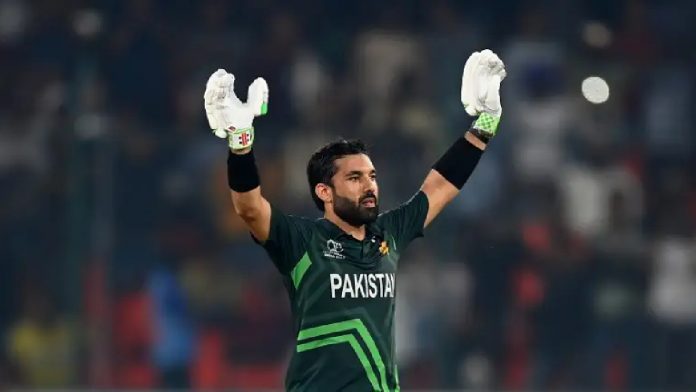He described himself as a hardworking player rather than one with an abundance of talent, in his usual self-deprecating manner.
Muhammad Rizwan gave off an air of effortless ease throughout the news conference. Without any residual discomfort from the cramping and back ache that had gripped him during his fire and brimstone 131 not out, he would walk right in. He would playfully inquire, “Am I too loud?,” while checking the microphone. Shall I rewind a little bit? Have they all settled in? Without displaying any signs of irritation, he would rock his chair back and forth, change its height, and stroke his well-groomed beard while his eyes darted back and forth.
Maybe the sweetness of the knock overshadowed the pain. He laughed and replied, “Sometimes it’s acting, sometimes it’s pain.” He didn’t stress over the pain or focus on it for too long. “I believe I will acknowledge Cliffy, our physiotherapist. The way he administered some magic—I’m not sure what you call it—it’s like a medication, he would remark.
The pain persisted in changing. “I’m fine right now, but sometimes I get pain or cramps, and sometimes I don’t,” he remarked.
However, it was evident that he was in excruciating pain when batting in the middle, as he frequently clutched his back in anguish. But he never gave up: “You know how Sri Lanka bowls, they have some good bowlers, so during my batting I didn’t want to give it away.” It will be hard for the new batsman if I give him the wicket at that point. Since I was coming on seven on eight in that role in the beginning of my career, I saw this. It’s really difficult for the other batsman to follow if I give him a wicket at that point,” he remarked.
Even though Pakistan lost Imam-ul-Haq and Babar Azam early on, they did not blow up. Abdul Rahman, our coach, and a few other players joined me when we arrived at the ground, and he stated to Rizwan, “This pitch looks like a batting pitch.” I informed Nawaz and the other two to three guys that I hoped it would be ideal if we limited it to 340 or more while we were bowling inside—I believe it was 33-32 at the moment. “We’re not doing good bowling if it goes above that,” he recalled.
Shafique was just five innings old when he received his straightforward advise from him as he was playing in his first World Cup. Abdullah was told by me not to look at the board. As there were three separate plans—one for till 20 over, another for till 30 over, and yet another for 40 over—we continued to stick to our strategy. We intended to do this. He analysed the hunt, saying, “It is this communication and calculation (that helped us).”
However, he would occasionally get pensive, downplaying the innings and thanking fate for his century. I’m aware of Allah’s requirements. Almighty’s demand of me is unreasonable since, as a Muslim, I believe that Allah is all that I have. After all, if this is true, then Allah is the Lord of the Worlds and is there for Joe Root and Virat Kohli of India as well. Everyone owns Steve Smith, too,” he clarified. During the press conference, he would say “dua” multiple times.
As evidence, he gestured to a thick edge that cleared the point fielder early in the inning. “In any given game, and if you examine my initial edge for three runs, which cleared the fielder, it might have also ended up in the fielder’s hands. But these are things I believe in,” he remarked.
He described himself as a hardworking player rather than one with an abundance of talent, in his usual self-deprecating manner. “It involves perseverance, guts, and timing your good deed execution perfectly. Allah will handle the rest, he declared.
He mentioned the affection, or mohabbat, he and his teammates received from the audience, and the atmosphere lightened once more. “I felt like I was playing in front of crowd of Rawalpindi; our ground in Lahore is big and a lot of people come there; this ground felt like Rawalpindi,” he said. The match appears to be taking place in Rawalpindi, Pakistan these days.
Every now and again he would joke around. He pointed his ears towards the direction of the zoom call and responded, “Haan bhai, haa, awaaz aara hain,” like you see in 90s films, in response to a Pakistani journalist asking if he is audible. Aat hain, he said, glancing out at the throng. It would take some time for the sound to travel because it is coming from a distance. He was able to divide the floor.
“Hamne, sirf Nizam saab ka mahal dekha!” he said in response to a journalist who inquired about his visitation to Char Minar. He would answer, in response to a lengthy and convoluted query, “Sawaal ka jawaab bhool gaye toh bata dijiyega.” Merely khayaal se chaar sawaal ho gaye.
He took time to enjoy the moment and snap photographs with some of the guards and attendees, basking in the happiness that followed the knock. Just as the weary groundsmen started to fasten a tarpaulin sheet over the ground, he took a long, hard look at the ground of his most famous exploit and peered up at the dreary sky as he walked out of the press conference room and into the dressing room. Did he cry at all? He might have, maybe. a happy tear.














